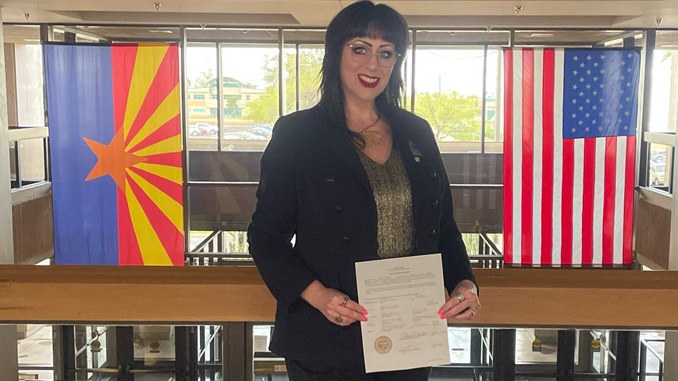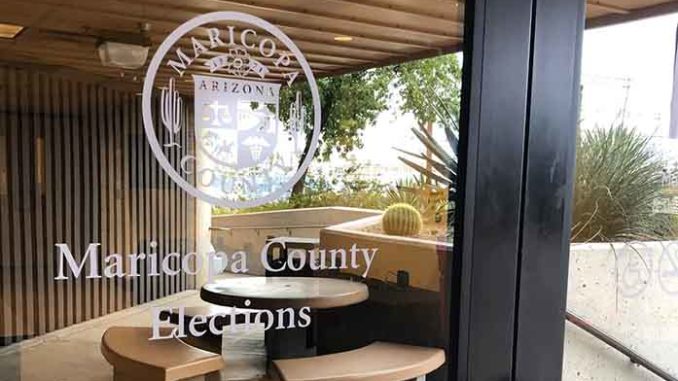
by Staff Reporter | Jul 27, 2024 | News
By Staff Reporter |
A federal investigation into the death of a Phoenix Marine Corps veteran published on Wednesday revealed that a Veterans Administration (VA) facility was to blame, due to insufficient and lacking health care practices and policies.
The VA Office of Inspector General (OIG) found that the deceased Marine veteran experienced a delay in basic life support and numerous deficiencies with regard to initiating emergency medical care at Carl T. Hayden Medical Center in Phoenix: conflicting facility policies inconsistent with Veterans Health Administration requirements, lack of layperson CPR training, lack of an automatic external defibrillator, lack of wearable cardioverter defibrillator as ordered, and failure to assess vital signs at an appointment preceding the medical emergency.
The OIG report determined that the facility leaders’ lack of response to treating the veteran was out of alignment with the VA’s high reliability organization (HRO) principals and I CARE values. It further found that the patient safety manager failed to investigate the related patient safety report, therefore resulting in an inaccurate harm assessment. And, the OIG found that both the patient safety manager and facility director failed to ensure a timely review of the report and investigation.
Congressman Ruben Gallego, also a Marine Corps combat veteran, issued a statement in response to the report. Gallego said the VA center investigation revealed the treatment to not only be insufficient, but “disturbing [and] dangerous.”
“The fact that something as simple as vital signs were not taken at the beginning of the appointment is particularly shocking,” said Gallego.
The 55-page report indicated that the veteran’s death may have been preventable, had better policies and procedures been exercised. Upon the veteran collapsing following an outpatient appointment, the facility operator rebuffed a rapid response attempt by a hospitality employee and advised to call VA police instead. The employee then called 911. As a result, the veteran waited 11 minutes prior to paramedics arriving, administering basic life support, and transporting him to a community hospital where the veteran died two days later.
The Phoenix facility’s policy restricted rapid response teams to events inside buildings and relegated all other emergencies to 911 and VA police, regardless of the proximity of the emergency to the building. The hospitality employee who attempted to save the veteran’s life called for a rapid response team due to the emergency’s proximity to the building, in the knowledge that they would arrive faster than the other responders. The OIG in its report expressed concern that the facility had elevated policy above all else, including lifesaving measures.
“The OIG is concerned that facility policy regarding responses to medical emergencies does not align with Veterans Health Administration (VHA) policy to ‘optimize patient safety for those requiring resuscitation’ and ensure ‘emergency response capability to manage cardiac arrests on VHA property,’” read the report.
Even prior to the emergency event, the OIG found that the veteran suffered from apparent deficiencies in medical care, such as the absence of the needed wearable cardioverter defibrillator as ordered by the veteran’s cardiologist, and no health care personnel took complete vital signs as required during the veteran’s outpatient exam.
The OIG issued 10 recommendations to the facility, which involved aligning policies with VA policies and procedures so they no longer conflict.
AZ Free News is your #1 source for Arizona news and politics. You can send us news tips using this link.

by Matthew Holloway | Jul 26, 2024 | News
By Matthew Holloway |
Reporting from The Post Millennial’s Senior Editor Andy Ngô revealed this month that on July 4th, a “pro-Palestinian” protester shot and killed Paul Franco, 51, after a fight broke out between him, his girlfriend Stephanie Renteria, and protesters in Phoenix, AZ.
According to Ngô, Renteria said Franco was killed defending her. “I just remember a black shadow just walking up to Paul and then shooting him,” she said.
Phoenix police reportedly served a search warrant on the home of a person of interest in the murder, widely reported as woman. However, Ngô reported Wednesday, “the person being investigated for allegedly shooting dead the 51-year-old Latino father is Muslim trans Antifa member Sumayyah Dawud, a man previously known as Britney Erica Austin and originally, Eric Austin.”
Ngô added that Muslim groups who had previously defended Austin cut him off after discovering his identity as a ‘transgender’ man.
In a report posted to X, Ngô went on to reveal that Austin has historically been involved with BLM-Antifa extremism dating back to the widespread 2020 riots adding that he is a “a fundamentalist Muslim sympathetic to radical Islam,” and has sued the Phoenix Police Department in the past for removing his Muslim facial covering during an arrest. Austin has reportedly claimed he was acting in self-defense when he shot and killed Franco. Shared video footage from 12News and footage from a June 15th action that found Austin, now known as Sumayyah Dawud taking part of a mob action against a Scottsdale restaurant.
Resist the Mainstream posted that “Sumayyah Dawud, a man previously known as Britney Erica Austin and originally, Eric Austin, has a long history of far-left extremism and is sympathetic to radical Islam, according to Ngo,” and posted social media comments of “Dawud” extolling the virtues of armed extremism saying, “radical folx (sic) who get in the streets & engage in high risk direct actions and /or do direct confrontation against fascists/white supremacists need to be armed.”
Per AZFamily, Franco and Renteria were walking home from the Fabulous Phoenix Fourth event at Steele Indian School Park and Renteria became embroiled in an argument with the protesters near Camelback Road and Central Avenue. The verbal dispute then devolved into a physical altercation. Within minutes, Paul Franco was shot several times in front of the apartment complex where he lived. He was pronounced dead on the scene.
AZFamily, citing Phoenix PD, reported “a woman they believed was involved in the shooting was taken in for questioning, then released without any charges being filed, claiming self-defense.”
As reported by ABC15, cell phone video obtained by the outlet shows Franco and Renteria shouting at the pro-Palestine protesters near Steele Indian School Park that evening. Both Franco’s family and Austin claim they were acting in self-defense. Another man, one of the protestors was reportedly stabbed.
In an interview with 12News, Renteria explained that after Phoenix Police broke up the initial argument with the protesters, she and Franco returned to their apartment. The protesters followed them. She told the reporters, “We threw eggs, and they threw rocks at us. And after they threw rocks, some of them jumped the wall.” She said that several of them followed a car into the complex’s private property and that she was confronted and punched by an unidentified woman.
“I just remember a lady coming up to me, and she said, ‘You threw a f’ing egg at me,’ and then she hit me.”
According to Phoenix PD, Austin stated that he fired on Franco in self-defense. Renteria however adamantly told 12News that Franco did not fire first and was shot and killed defending her.
“It was them. It was them that fired first. I just remember a black shadow just walking up to Paul and then shooting him,” she said.
Renteria told 12News “People could just come into your property and claim self-defense. It’s scary.” She added, “I want the people that assaulted us to be charged. I want some type of justice.”
In a post to X, Ngô wrote, “The family of the Phoenix man shot dead by a trans Antifa member following a Palestine direct action believe the @PhoenixPolice are afraid of charging him.”
Matthew Holloway is a senior reporter for AZ Free News. Follow him on X for his latest stories, or email tips to Matthew@azfreenews.com.

by Staff Reporter | Jul 26, 2024 | News
By Staff Reporter |
A border security champion is seeking to return to the Arizona Legislature for her second term in office.
State Senator Justine Wadsack, a Republican, is running for reelection in Arizona Legislative District 17, which covers Pima County, north of Tucson, including Marana and Catalina. She has resided in Pima County for more than four decades, living in several of its cities throughout this time.
Wadsack is the Vice Chairman of the Senate Education Committee, and a member of the Government, Health and Human Services, Judiciary, and Senate Ethics Committees. Previously, she served as a member of the Director Nominations and Elections Committees.
On her campaign website, Wadsack lists “border security” as her number-one issue. She writes that, “Pima County is on the front lines of America’s immigration crisis. The Democratic Party is allowing our people to become dispossessed from our own nation as it allows hundreds of thousands of illegal aliens to violate our sovereignty every month. Arizona’s border is the largest crime scene in the United States, and so many of our domestic problems are symptoms of this core crisis. Until this invasion is stopped and the rule of law upheld, the border must be every Americans’ first priority.”
To that end, Wadsack sponsored SB 1608, which “classifies the unlawful use of an electronic device to smuggle human beings as a class 2 felony and prohibits a person from being released from confinement, if convicted” – according to the purpose provided by the Arizona State Senate. The bill passed with a 16-13 vote (with one member not voting). All Republicans voted in favor of the proposal.
In a statement after the vote, Wadsack said, “Human smuggling is at an all-time high. Cartels are recruiting people, often our children, to participate in smuggling operations using various apps such as Snapchat and WhatsApp. The use of social media platforms to carry out these crimes has grown exponentially and contributes to the humanitarian crisis caused by Biden’s open border policies. Our children, our law enforcement, and our communities are being targeted, and it won’t be tolerated.”
Last year, Senator Wadsack had introduced the same bill, which passed out of both chambers. Governor Katie Hobbs, a Democrat, vetoed the legislation, writing that it “is yet another attempt by the majority to criminalize organizations and individuals who aim to support immigrants and refugees.”
Over the years, law enforcement officials, including Cochise County Sheriff Mark Dannels and former Arizona Attorney General Mark Brnovich, have warned of the dangers on these social media platforms posed to American teenagers, who are highly sought-after targets by cartels and smugglers for illegal couriering activities. In a 2022 op-ed for Fox News, the two officials wrote that “drug cartels are now using SnapChat, Instagram, and other social media apps to recruit American teenagers from around the country to transport migrants and drugs from the border,” and that “high-speed pursuits between these teenagers and local law enforcement have become daily events.”
The two officials concluded their piece by sounding the alarm about the reality on the ground, saying, “As law enforcement officials in our state, we can say with full confidence that we have never seen anything like this crisis at the border and how it is affecting everyday Americans in their communities. While many media outlets have declined to show the American public the disturbing images of increasing high-speed pursuits and other border-related devastation here at home, the death and danger they present are very real; lives are at stake.”
Senator Wadsack, the first-term legislator, also voted for HCR 2060, the Arizona Secure the Border Act, in May. Thanks to its successful passage out of the state House and Senate, this measure will be on the November General Election ballot, giving voters an opportunity to take some border security options into their own hands and to empower law enforcement with more resources to protect Arizona communities.
In August 2023, the Arizona Republican Party named Wadsack as its “Freshman Senator of the Year.” The release from the political organization noted that Wadsack “has persistently fought for common sense laws that benefit all Arizonans, not just those in her district,” and that “Her achievements reflect her ability to work effectively across party lines, embodying the true spirit of bipartisan collaboration.”
The Arizona Coalition of School Board Members also selected Wadsack to be its “Elected Official of the Year” this past February. The group wrote that “While only one of her bills successfully made it through the legislature (later to be vetoed by the Governor), the effort cannot be denied as Senator Wadsack demonstrated a passion for parental rights in the education space. Her bills reflect the AZ Coalition of School Board Member values of academic excellence and transparency.”
Arizona Legislative District 17 leans Republican, with an 8.3% vote spread between Republicans and Demcorats in the past nine statewide elections, according to the Arizona Independent Redistricting Commission. In those statewide contests, Republicans have won all nine of the elections.
Wadsack is running against former legislator Vince Leach for the Republican nomination in the upcoming July 30 primary election. She defeated Leach in a three-way primary two years ago. The winner of this primary race will face off against John McLean, who is running unopposed for the Democrat nomination. McLean is a third-generation Arizonan, who has lived in Pima County for more than three decades.
AZ Free News is your #1 source for Arizona news and politics. You can send us news tips using this link.

by Matthew Holloway | Jul 25, 2024 | News
By Matthew Holloway |
On Tuesday, Maricopa County Elections officials held a press conference on the expectations voters can have over the next weeks as primary votes are cast and tabulated in the July 30th election. The performance of the Arizona election system will likely presage the General Election experience we can expect in November. Amidst the CrowdStrike outage and the attempted assassination of President Donald Trump looming over the proceedings the officials took questions from several outlets and briefed the press on projected turnout.
Maricopa County District 3 Supervisor Bill Gates began by addressing the increasingly tense atmosphere to the gathered reporters saying, “Unfortunately we’re talking about and thinking about political violence and our country right now in a way that we haven’t in a long time.”
He continued citing security concerns on election day, “We know that’s on people’s minds and that’s why we are committed to providing a safe and secure experience both for our elections workers as well as those people who go to vote .”
Gates added, “It’s very important that everybody understands that me and my colleagues on the board are committed to safe, secure and transparent elections.”
Responding to questions about the impact of CrowdStrike’s Friday outage on the election system, Fields Moseley, the Maricopa County Communications Director, told 12News, “We feel like we had a fairly low impact. Still, almost 400 people voted on Friday. We opened at 9 a.m. with four vote centers open and had a rolling opening all day long as those were fixed and 40 were opened before the end of the day. None of the tabulators were affected by this. They’re on an air-gap system. They’re not connected to the internet.”
The Republican National Committee and Republican Party of Arizona sent a joint letter to the Maricopa County Elections Director expressing their concerns following the disruption.
“The most recent occurrence is extremely worrisome due to the online nature of the issue and the implications if this were to happen on Election Day,” the state and national GOP said in part.
AZGOP Chair Gina Swoboda said in a statement accompanying the letter:
“Following the discovery that the global CrowdStrike outage had affected elections systems in Maricopa and Pima counties in Arizona, the RNC, AZGOP, and Trump Campaign’s election integrity department have sent a letter to every county in the state. We are demanding information on any other systems affected, if vulnerabilities were exploited, and full evidence demonstrating that there were no breaches to determine the extent of the issue. Most importantly, we must have complete assurance that this will not happen again and that the elections systems are not susceptible to these threats during our country’s most important election. These breaches highlight alarming fragilities in the voting system, and we need confirmation that there was no nefarious activity. How was this allowed to happen in a critical battleground state during the primary election?
Voters must have full confidence their ballots are protected. We will uncover the evidence and pursue every avenue needed to ensure the system is secure.”
Moseley replied, “We’re aware of the letter from the RNC. We will respond to the RNC at the appropriate time.” He continued, “We already publicly explained what happened to our ballot on demand system on Friday during the day. We opened at 9:00 a.m. with four vote centers open and had a rolling opening all day long as those were fixed and 40 were open before the end of the day. None of the tabulators were affected by this. They’re on an air gap system. They’re not connected to the internet.”
Addressing concerns for the General Election, Jennifer Liewer, the Maricopa County Deputy Elections Director for Communications told the conference, “We will have over 240 vote centers open, so if a vote center does go down, people are able to choose from a different vote center, but we will have increased resources, increased technology personnel.” She added, “We are prepared should something occur on Election Day to be able to be responsive without knowing that what exactly might happen and obviously you can um do the best you can to plan for things. And I think our staff being flexible responsive.”
She continued, “Our IT staff were up in the middle of the night on site at MCTEC helping get computers rebooted. It was really all hands on deck and Maricopa County voters can know that we are dedicated and even if that means getting up in the middle of the night and coming into work, we’ll do whatever it takes to make sure that everybody who wants to cast a vote has the ability to do so.”
Moseley, describing the impact of the CrowdStrike outage, noted, “Friday was a pretty unique event,” even quipping: “I mean let’s ask Delta Airlines.” Responding to a question on converting to a different system he told reporters, that he couldn’t say for sure if the county is “re-evaluating,” its use of CrowdStrike for cyber security or Microsoft’s products, which he referred to as “ubiquitous.”
The officials noted that the county is anticipating 623,000 ballots to be cast in total by mail, dropbox, or in-person for the primary election with approximately 94,000 of those being in-person on election day. Approximate projections for total turnout are from 718,000-894,000 or about 30% of the electorate.
Assistant County Manager Zach Schira stressed the staffing levels and heavy investment the county has made in elections stating, “Good people ran lawful elections in Maricopa County in 2020 and 2022 and are doing so in 2024. Our full-time election staff, supplemented by thousands of members of this community, are trained to ensure we are following the law.” He added, “Over the past year, the Board of Supervisors has invested heavily in elections: more than $15 million in new money towards resources and equipment that directly impact the efficiency and security of our operations. Bottom line: we are well resourced, well planned, well trained for next Tuesday’s Primary and the entire 2024 cycle.”
Matthew Holloway is a senior reporter for AZ Free News. Follow him on X for his latest stories, or email tips to Matthew@azfreenews.com.

by Staff Reporter | Jul 25, 2024 | Economy, News
By Staff Reporter |
A radical Democrat legislator is seeking a return to a middle-of the-road Arizona district in the upcoming November General Election.
State Representative Keith Seaman is running for reelection in Arizona Legislative District 16. Seaman assumed office in January 2023 after narrowly finishing second in the district in the November 2022 General Election results, beating Republican challenger Rob Hudelson by 644 votes. Seaman now represents the district in the State House of Representative alongside his seatmate, Representative Teresa Martinez, a Republican.
Though the district is more moderate, Seaman has been anything but, as attested by his first term in the state house. On his campaign website, Seaman lists endorsements from left-leaning organizations, such as Arizona Education Association, Save Our Schools Arizona, National Organization for Women Arizona, and Sierra Club Grand Canyon Chapter.
Seaman’s votes in the Arizona Legislature show a pattern of being soft on crime. He voted against HB 2435, which would have “require[d] a person who is convicted of a third or subsequent organized retail theft offense to be sentenced as a category two repetitive offender” (2024). He also voted against SB 1583, which would have mandated that “a level one sex offender who commits specified sexual offenses is required to register on the internet sex offender website if the offender was sentenced for a dangerous crime against children” (2023). Additionally, he voted against SCR 1021, a ballot referral, which would “statutorily require an adult who is convicted of a class 2 felony for any child sex trafficking offense to be sentenced to natural life imprisonment” – should voters approve it in the upcoming November General Election.
The Democrat legislator also made controversial votes related to the border crisis facing his state. He opposed HB 2621, which would have deemed that the trafficking of fentanyl across Arizona’s border is a public health crisis. He also spurned SCR 1042, which “proclaim[ed] the Legislature’s support for the people and government of the state of Texas in its efforts to secure [the U.S.] southern border.”
He also took a stance against policies that would lead to economic prosperity in Arizona. Seaman voted no on SB 1260, which would have “reduced the state’s small business income tax rate to 2.5%” (2023). And he opposed SB 1370, the lemonade stand bill, which would have exempted a minor or a person who has not graduated from high school from the requirement to obtain a TPT license and pay TPT (use tax and local excise taxes) if the person’s business gross proceeds of sales or gross income is less than $10,000 per calendar year.
Seaman has also proven to be an ardent opponent of Arizona’s historic school choice program. Last year, he joined several of his colleagues in the legislature’s Teacher Caucus to castigate the ESA program. He posted, “As a retired educator, I support our public schools and will fight to ensure that they receive the funding they need. Arizona taxpayer dollars should not be used to fund private institutions while public schools struggle with budget cuts and a lack of resources for students.”
On the education front, Seaman voted against HB 2629, which would have “establish[ed] November 7 of each year as Victims of Communism Day and require[d] the State Board of Education to create a list of recommended resources for mandatory instruction on the topic in certain public school courses.” He also registered a vote against HB 2779, which would have “specifie[d] that the State Board of Education, must require, in course of study and competency requirements, that students be taught about the Holocaust and other genocides for at least three school periods, or the equivalent, on at least two separate occasions during any of the 7th-12th grades.”
It wasn’t just what Seaman opposed that made him too radical for the district; it was also what he promoted that flew in the face of a likely majority of his constituents. Seamon cosponsored HB 2610, which would have created a state-owned bank (2023). He cosponsored HB 2068, which would have repealed designating school sports by biological sex (2023). And he cosponsored HB 2653, which would have established that “restaurants and other food service establishments in this state may only serve water and disposable straws to customers on request” (2023).
Arizona Legislative District 16 is one of the most competitive in the state with a 3.6% vote spread between Republicans and Democrats in the last nine statewide elections, according to the Arizona Independent Redistricting Commission. However, in those nine statewide elections, Republicans have emerged victorious in all nine.
Representative Seaman’s daughter, Stacey, is attempting to join him in the legislature next year. She is running for state senate and will go head-to-head against incumbent T.J. Shope for the right to represent Arizona Legislative District 16 constituents for the next two years.
Seaman is again the only Democrat running in the Legislative District 16 primary, as his party again attempts to gain an advantage in the General Election with this single-shot approach. He will face two Republicans who will emerge from a crowded primary later this month. Those Republicans are Martinez, Hudelson, Chris Lopez, and Gabriela Saucedo Mercer.
AZ Free News is your #1 source for Arizona news and politics. You can send us news tips using this link.

by Staff Reporter | Jul 25, 2024 | News
By Staff Reporter |
A major Democrat super political action committee, the PAC for America’s Future, is investing heavily in Arizona this election year. PAC for America’s Future is not only the largest PAC in Arizona; it is a top donor to the Democratic Party.
PAC For America’s Future has focused on Arizona, one of the more contentious of the six key swing states for the election, alongside Wisconsin, Pennsylvania, Michigan, Georgia, and Nevada. According to the Arizona secretary of state’s campaign finance portal, the PAC is the second-largest in the state with over $9.5 million in income and $4.2 million in expenditures, after Arizona for Abortion Access ($12.3 million income, $9.6 million expense). However, PAC for America’s Future has the highest cash balance in the state: over $8.3 million.
These funds are from out-of-state interests, not Arizonans. AZ Free News reviewed all finance reports and found that total funds from Arizonans amounted to slightly less than $13,500 across 122 donations (some of whom were recurring donors). That’s .0014 percent of total donations since last year.
Most of the other funds come from sizable contributions by wealthy out-of-state Democrats. Jonathan Soros, heir to father George Soros’ $25 billion empire, has given $2 million to PAC for America’s Future this year and remains their single-highest donor.
Other top donors from last year to this year include:
- $500,000 from Lynn Schusterman, an Oklahoma billionaire and wife of the late oil and gas founder Charles Schusterman
- $1 million from Wendy and Barry Munger, Californians and children of former Berkshire Hathaway vice chair and late Charles Munger
- $400,000 from Indiana philanthropist Deborah Simon, daughter of billionaire shopping mall magnate Melvin Simon
- $400,000 from Steven Laufer, economist with the Federal Reserve Board
- $300,000 from Debra Ann Efroymson, a New Mexico descendant of the wealthy Efroymson dynasty
- $250,000 from New York property management tycoon Gideon Friedman
- $245,000 from billionaire California philanthropist John Pritzker, son of Hyatt Corporation founder Jay Pritzker
- $200,000 from David Karp, former CEO of major social media platform Tumblr
- $100,000 from a Paul Karp (Paul Haahr), a Google software engineer out of California
- $100,000 from Linda Schlein, the wife to venture capitalist Ted Schlein out of California
- $170,000 from multiple members of the billionaire Pigott family out of Seattle, Washington
- $75,000 from Juan Sebastian Scripps, an angel investor out of Kentucky
- $75,000 from Andrew Beck, a New York-based philanthropist
- $50,000 from Steven Spielberg, the acclaimed Hollywood director
- $50,000 from Kate Capshaw, a Hollywood actress
- $50,000 from Jacqueline Asplundh, the Asplundh Tree Expert Company scion out of Florida
- $50,000 from Brian Rosenthal, the engineering director for Facebook residing in New York
- $50,000 from Lorin Silverman, the New York descendant of business tycoon Marty Silverman
PAC for America’s Future’s affiliates have also brought in millions for the cause. These affiliates serve as holding entities for transferring funds to the PAC.
PAC for America’s Future formerly went by the “Future Now Fund” up until 2021. It’s a repository for funds from major Democratic dark money donors like George Soros and funder to one of the state’s leading dark money nonprofits, Progress Arizona, the outfit led in part by Governor Katie Hobbs’ former press secretary Josselyn Berry. (She rejoined after resigning from the governor’s office due to her posted gun violence threat to “transphobes” last year within hours of the Nashville elementary school shooting.)
Given its most recent name, it should come as no surprise that PAC for America’s Future is listed as “related” on tax returns to two similarly named 501c4 nonprofit entities: Future Now Action and Future Forward USA Action. The two nonprofits also operate a super PAC, Future Forward PAC, which has received nearly $19 million so far this year from Future Forward USA Action ($12 million in 2022).
This network of millions is a critical resource for the Democratic Party during election years.
Jennifer O’Malley Dillon, White House deputy chief of staff and Biden’s 2020 campaign manager, told The New York Times that the Future Forward ecosystem was “critical” in the 2020 presidential election, and would be again this year.
The Biden team directed his 2020 campaign finance director and White House deputy assistant Katie Petrelius to join the Future Forward team.
The Soros family’s Open Societies Foundation gave $15 million to Future Forward USA Action in 2022 and $5.5 million in 2021. The Arabella Advisors dark money network has also given millions to PAC for America’s Future and the two related “Future” nonprofit entities.
Although few of this mega PAC’s funds come from Arizonans, the Arizona Democratic Party, its candidates, and close-knit organizations have benefitted. In this most recent quarterly campaign finance report, as well as the last, the Arizona Democratic Party received nearly $300,000.
In the last campaign finance report, PAC for America’s Future reported spending over $140,000 on Arizona’s Democratic candidates, with all candidates receiving $10,800 boosts each. AZ List PAC also received $27,000.
For the State House, these donations went to candidates Deborah Howard, Stephanie Simacek, Oscar De Los Santos, Brandy Reese, Nicholas Gonzales, Matias Rosales, Mariana Sandoval, Karen Gresham, and Kevin Volk. For the State Senate, these donations went to Christine Marsh, Analise Ortiz, John McLean, and Stacy Seaman.
PAC for America’s Future is technically a “hybrid” committee — or “Carey” committee — meaning it’s capable of making independent expenditures as well as direct contributions to candidates.
A donor’s first $5,000 goes to a contribution account per PAC for America’s Future’s donor site. All funds beyond that $5,000 cap go into a non-federal account. That latter account is for PAC for America’s Future’s 527 committee, a tax-exempt type of committee that allows for unlimited donations to support or defeat political candidates but requires disclosure of all donors and expenses.
PAC for America’s Future’s 527 Committee then funnels the donations in excess of $5,000 — estimated to amount to tens of millions — to PAC for America’s Future’s joint initiative with Future Now Action, “The States Project” (TSP).
TSP took credit for moves undertaken to flip the Arizona legislature blue, dating back to their initial claim of victory in 2018 with four seats flipped for Democrats in the state House; then two new seats in the House and one new seat in the Senate in 2020; and then defense of won seats in 2022.
“Flipping both chambers in Arizona is possible in 2024. In the Senate 1,500 voters changing their minds would have shifted the balance of power in 2022. And in the House, we see a clear path to governing power, as less than 1,000 voters shifting would have ended rightwing control. Investing in the districts where we see the opportunities to shift power now gives us the strongest shot at achieving our goals in the state.” – TSP
Based on the influx of funds through their various PAC for America’s future tributaries, it appears that wealthy out-of-state interests have a vested interest in ensuring Arizona goes from a swing state to a firmly blue stronghold.
AZ Free News is your #1 source for Arizona news and politics. You can send us news tips using this link.






